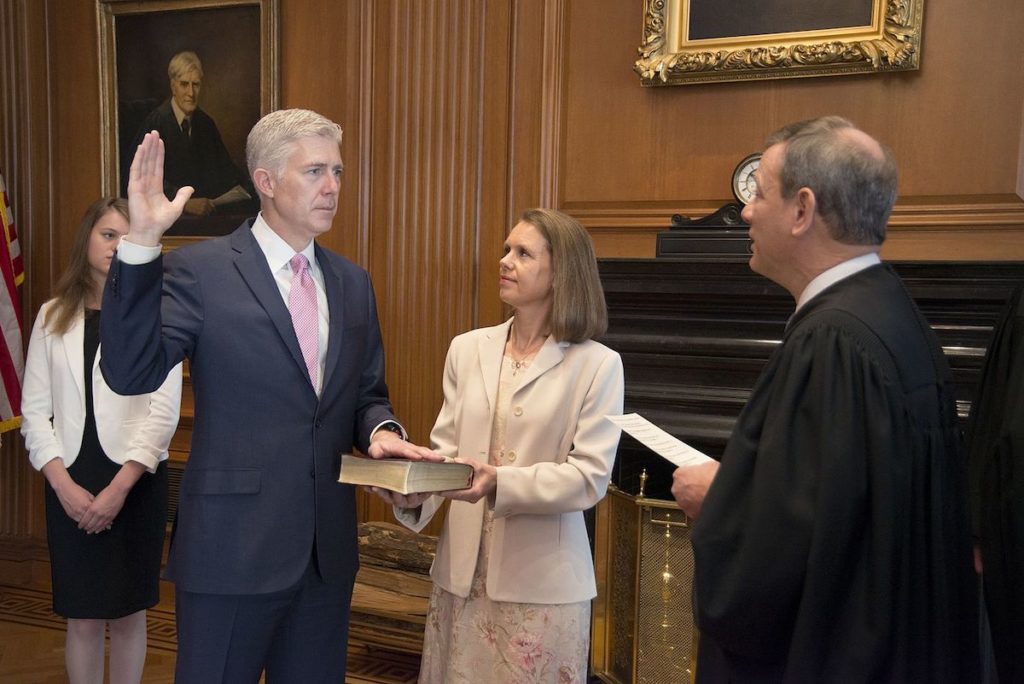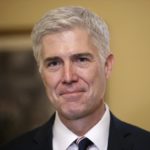With the trial-by-fire of Brett Kavanaugh beginning, the composition of the Supreme Court promises to shift in a significant way. As we make predictions about what that shift might mean, the judicial philosophy of the high court’s penultimate nominee, Neil Gorsuch, is worth considering.
This essay considers the influence of natural law reasoning on Gorsuch’s thinking. Its first part identifies and explains several ways Gorsuch considers appeals to natural law reasoning useful in legal reasoning. Its second part discusses his use of natural law reasoning in relation to assisted suicide.
Natural law theory does not deny the claim of legal positivism that human laws are social facts enacted by the positive will of legislators. But it proposes that law, more fundamentally, is a set of publically sanctioned reasons directing action consistent with the common good.
We can identify four reasons that Gorsuch considers natural law reasoning relevant to legal reasoning. They might be described as the analytic justification (natural law theory’s facility in aiding understanding of law), the anthropological justification (its conceptualization of human good), the normative justification (its facility for securing justice), and the libertarian justification (its facility for securing rightful political liberty).
Start your day with Public Discourse
Sign up and get our daily essays sent straight to your inbox.The Analytic Justification
Natural law reasoning is rationally superior to other methods in conceptualizing and explaining legal realities.
Let’s use the concept of intention to illustrate this point. Gorsuch thinks that, when explaining action, making a distinction between what is intended and what is merely tolerated is relevant to the law’s conceptualizing of legal liability.
In a speech that was later published as a book chapter, Intention and the Allocation of Risk, Gorsuch quotes two legal theorists, Richard Posner and Glanville Williams. Both argue that intention should not be what’s central to resolving questions of liability. By way of example, Williams proposes a fictional scenario: a spy on an airplane is carrying a top-secret device to the enemy. He plans to exit the plane by parachute and forces a steward to prepare the chute. The steward, mindful of what’s at stake, cuts the chute’s rip cord. The spy leaps, pulls the defective cord, and plunges to his death; the dangerous device is destroyed along with him. Does the question of whether the steward intended to kill the spy significantly change the question of his legal liability for bringing about the spy’s death?
Williams says no. The steward knew what would happen if he performed the contemplated behavior, and he still chose that behavior. Therefore, the law should treat the situation as if he intended the spy’s death and not involve itself “in fine distinctions” that end by making it “unduly lenient.” In other words, Williams argues for collapsing foresight into intention.
Gorsuch disagrees. He thinks that conflating intention and foresight fails to make a distinction that’s analytically meaningful for understanding the steward’s actions, and so for understanding his culpability. He quotes John Finnis, who says:
Those who wear shoes don’t intend to wear them out [even though they may foresee that as an inevitable consequence]. Those who fly the Atlantic foreseeing certain jetlag [likewise] don’t do so with the intention to get jetlag; those who drink too heavily rarely intend the hangover they know is certain.
How does Gorsuch’s defense of a distinction in the law of liability based upon intention tell us anything about his use of or commitment to natural law reasoning? In his book The Future of Assisted Suicide and Euthanasia, he defends a meaningful analytic distinction between intending and foreseeing because he thinks that willing something to take place is different from merely accepting that something take place. Tolerating an effect and willing that effect are different acts; to deny the relevance of the distinction, he says, is “to disregard the role of free will in the world.”
And what is that role? The role of free human agency is nothing less than the self-government and self-determination of the person. Agency operates, as it were, upon a world of moral truths, upon a range of possibilities the willing or non-willing of which Gorsuch thinks matters. Since willing and foreseeing are different acts, they should be conceived of as different, and sometimes be treated differently by the law.
Anthropological Justification
Gorsuch’s anthropological justification for invoking natural law reasoning also can be illustrated via the notion of intention. He says the law reserves some of its harshest penalties for intentional wrongs “precisely because to intend something is to endorse it as a matter of free will.”
Recall what we said a moment ago. In Gorsuch’s words: “Freely choosing something matters”; it matters because “intentional choices reflect and shape our character—who we are and who we wish to be—in a way that unintended or accidental consequences cannot. Our intentional choices define us.” Gorsuch then says something rather extraordinary, something Karol Wojtyła (John Paul II) proposed in his work, The Acting Person. Gorsuch says: “Our intentional choices … last, [they] remain as part of one’s will, one’s orientation toward the world.” This is a core principle of any sound conception of natural law. Our choices define us.
They shape us, Gorsuch argues, precisely in relation to objective human goods. Gorsuch argues that there are human goods (e.g., “human life”) that are “fundamentally and inherently valuable.” Following Aquinas and Finnis, he refers to them as “basic goods.” A basic good is a reason for action, which needs no other reason to make its pursuit intelligible. It is “categorically good, not something that is good only because of its instrumental usefulness in achieving some other end.” It is “an end in and of itself, fulfilling in its own right.” We come to recognize basic goods “from life’s experiences and observations of human nature.” We grasp that these goods are at stake in human choosing; that their realization is (as Aquinas says) to-be-pursued, and that what is contrary to them is to-be-avoided.
It is through our choices, then, that we bring our wills and so ourselves into a morally relevant relationship with these human goods. Our choices instantiate within us, into our reason and will (and indirectly into our affect), dispositions—virtues and vices—inclining us to further judgments and choices like those that instantiated them. The whole complex of enduring instantiations of these dispositions for or against the good is what we call moral character, and it comes about through free choice. For this reason, John Paul II said in Veritatis Splendor, we “parent” ourselves through our actions.
So, when Gorsuch says our “intentional choices define us,” he has a rich natural law understanding of human good and free choice underlying the assertion.
Normative Justification
The normative justification for natural law reasoning in jurisprudence is its facility for securing an outcome of justice.
Again, focusing on intention, Gorsuch argues that when one intentionally harms another, “one precisely makes [the other’s] loss one’s gain…, one to that extent uses them up, treats them as material, as a resource.” For this reason, the law has “traditionally” held that “one generally ought not to choose or intend to harm another person.” He says underlying this view is the judgment that human equality is at stake in choosing: the “traditional rule ‘expresses and preserves each individual person’s … dignity … as an equal.’ It recognizes that ‘to choose harm is the paradigmatic wrong; the exemplary instance of denial of right’” (internal quote from Finnis).
Underlying his remarks is a conception of innate human dignity, another traditional concept in classical natural law theory. Human nature possesses qualities—such as rationality and freedom—that elevate humans above all non-personal entities. In religious terms, humans are made “in the image of God” (Gen. 1:27). Gorsuch writes: “persons innately have dignity and are worthy of respect without regard to their perceived value based on some instrumental scale of usefulness or merit.” Out of this arises what he refers to as the “profound social and political commitment to human equality.” If we abandon a notion of innate dignity, we erode our foundation for treating each person equally under the law.
In a piercing rejoinder to legal theorists who reject the notion of intrinsic human dignity, such as Richard Posner and Ronald Dworkin, Gorsuch asks:
But if one’s valuable humanness (and thus legal inviolability) turns on one’s currently exercisable abilities for self-creation and self-expression, what specific traits and qualities must one exhibit? And how developed must they be before one qualifies for equal protection under the law? Dworkin tells us the Alzheimer’s patient does not meet his criteria. But what about those with low IQs? The mentally disabled? The autistic? Stroke victims? Infants with Down’s syndrome? The variations between persons, even those suffering from the same species of disability, are subtle and nearly endless, and any attempt to draw lines seems almost inevitably to become more or less an arbitrary and subjective enterprise.
This arbitrariness, he says, is illustrated in the fact that although these authors agree that one’s value relates to one’s ability to exercise certain capacities (autonomy, self-expression), “they differ markedly on which human lives possess the relevant capabilities and thus are valuable enough to merit equal and full protection under the law.”
They ask us to accept, judge, and decree that certain persons with certain (rather arbitrarily chosen) instrumental capacities are worth our total respect—inviolable under the law—while other persons who lack those capacities do not merit such esteem, respect, and protection. In the name of progressive policy, they would create a second class of citizens.
Only a notion of the equal and intrinsic dignity of every human person can guarantee a notion of equal rights and so equal protection under the law.
Libertarian Justification
Finally, Gorsuch believes that singling out intention in the assignment of legal liability has practical merit for securing rightful political liberty.
Using the example of conspiracy crimes, Gorsuch says requiring intent to be established before assigning legal liability for conspiracy protects those who are only tangentially associated with the crime—but not the intentional perpetrators—from being subject to what Learned Hand referred to as the “drag net” effect of the law, that is, the law’s sweeping up of “all those who have been associated in any degree whatever with the main offenders.” So, for example, phone companies that knowingly provide services to bookies, or an employee who puts through a shipment he knows to be illegal, need not worry that they will be subject to criminal prosecution. “In this way,” Gorsuch argues, “American law seeks to allow the liberty of normal commerce and communication between individuals without forcing them always to be on guard against [Glanville] Williams’ “oblique” intentions [i.e., culpability based upon material cooperation].”
Inviolability-of-Life Principle
We see an example of Gorsuch’s natural law reasoning in relation to the issue of medical assistance in suicide.
What is the practical pay-off of saying that life has inherent dignity? It provides an action theory governed by what he refers to as the norm of “respect.” In a section of his book entitled “What does it mean to respect human life as a basic good?”, he argues that since life is a fundamental aspect of our nature capable of being respected and protected (or diminished, harmed, and destroyed) precisely through deliberate action, it follows that “we can and should refrain from actions intended to do it harm.”
Such actions, after all, by their very definition evince a denial of life’s innate worth; they bespeak the view that human life is not itself a sufficient reason for action in and of itself but may be deliberately subordinated to other efforts and ends. To act intentionally against life is to suggest that its value rests only on its transient instrumental usefulness for other ends.
He calls this the “inviolability-of-life principle.” This principle has ready application, he thinks, to the question of physician assisted suicide: “The inviolability-of-life principle would, to be sure, rule out cases where the doctor intends to kill his or her patient.” He takes for granted, and rightly, that doctors who prescribe barbiturates to patients who request them in order to kill themselves necessarily intend the patient’s self-killing. It follows, he says, that current laws prohibiting assisted suicide should be retained.
Problems Assessing Moral Cooperation
If doctors who prescribe drugs to patients for purposes of self-killing share the bad will of the patients whose actions they facilitate, what about doctors who remove life support at the request of patients who request that removal in order to kill themselves?
Gorsuch raises the case of a patient who has made manifest to his clinician his intention to die so that insurance proceeds may benefit his family straight away. The patient asks his clinician to execute an order to withdraw life-sustaining treatment. Gorsuch asks: “Can a doctor or nurse assist in the discontinuation of treatment in such as case?” He replies: “I believe they can.” Executing the removal order need not imply that the clinician shares the patient’s intention to die. The doctor’s intention is narrowly shaped “on the ground that they [life-sustaining procedures] are no longer wanted by the patient/client.” There is no shared intent to die/bring about death, therefore no violation of the inviolability-of-life principle.
This seems to me incorrect. In this case, the clinician is prompted to act at the request of a patient whose will is to die by such and such means; the patient orders the clinician to adopt these means, and the clinician adopts them. How is this morally different from prescribing pills to a patient who orders them for purposes of self-killing? In both cases, the clinician does not merely, as Gorsuch says, “[provide or] cease professional services at the direction of a patient.” Rather, he executes the patient’s will. In both cases a form of behavior—withdrawing life support or prescribing deadly pills—is chosen by the patient to bring about death, and the clinician executes that choice. The clinician authorizes the patient to do what the patient intends to do through the act he authorizes. This is formal cooperation.
Killing and Letting Die
Despite his inconsistency here in applying his philosophical principles, the principles themselves are remarkably coherent for an American jurist.
Appealing to double-effect reasoning, Gorsuch argues that actions that hasten death, even foreseeably, can be justifiable, presuming they are not done for that purpose. They can be justifiable if they are chosen to bring about reasonable benefits such as freedom from the burdens of pain or medically futile treatments, and death—or its hastening—is not intended as an end or a means. The distinction, he believes, is critically important for maintaining the law’s integrity:
If we throw over existing law and permit some persons’ lives to be taken intentionally, how are we supposed to go about the business of sorting out which lives may be so taken? Whose life may be taken and who decides? Does it even matter whether we have the consent of those to be killed, at least if we can confidently conclude their lives really lack (what someone deems to be) sufficient instrumental value?
Still a meaningful distinction?
But if we know in advance that something we are considering is likely or even certainly to cause death, and with full knowledge we go ahead and do it, can we really say we did not intend the effect we knowingly caused? Is there really any meaningful distinction here between intention and foresight? We know from Gorsuch’s rejection of Williams’s account of oblique intention that he believes collapsing foresight into intent is an error on several levels. But as a jurist and not a philosopher, he doesn’t press this question. His concern is with the law. He conceives the legal “sweep” of the inviolability-of-life principle to be “relatively narrow”: “limiting state interference with private choices only to cases where the actor’s subjective and specific intent to harm a basic good exists and can be proven.” Yet, we might still put to Gorsuch’s account the question of the basis of the distinction in those cases, as he says, “even when death is fully foreseen”?
His reply would be that the basis is the relevant difference between knowing and willing. To foresee death is not necessarily “to endorse it as a matter of free will.” This is not to say there should be no liability, including criminal liability, for acts that cause but don’t intend death; and in some instances it may be justifiable to treat them as if they were intentional acts for purposes of assigning punishments. But the philosophical basis of such treatment would stem from the fact that the magnitude (or gravity) of the will’s evil is commensurate with that of an intentional wrongdoer; not that it’s the same kind of evil. Flagrant disregard for the welfare of innocents can be as wrong—and so as legally culpable—as instances of intentional harm.
Still, the distinction holds. What we intend shapes us differently from what we merely tolerate. Thus, anyone, including members of trusted professions, who intends to kill is—properly speaking—a killer and so ordinarily should be treated as such by the law.
Looking Forward
Gorsuch nowhere to my knowledge offers a developed natural law account of basic human goods. But his mentor John Finnis does. Finnis includes two that in addition to human life are relevant to cases making their way to the Supreme Court: the goods of religion and marriage. Since Gorsuch argues that law’s “focus on intent can … make a significant difference in the analysis of many legal questions across many fields and in many different ways,” we might very well speculate how it might work itself out on issues bearing upon life, marriage and religion that the High Court will likely or certainly be asked to take up during his tenure. But I punt this speculation to scholars whose competence in jurisprudence is greater than my own.














